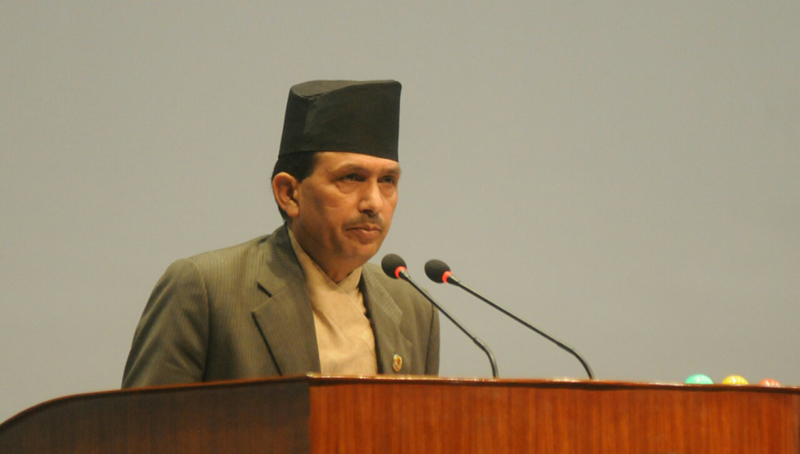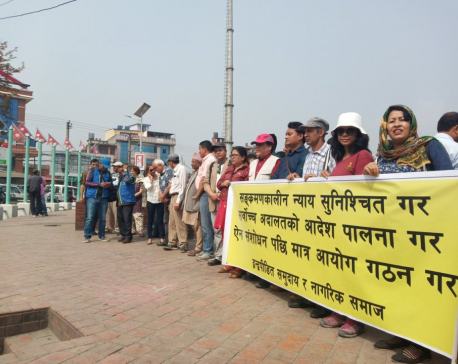
OR
Nepal to follow its own transitional justice model: Law minister
Published On: March 11, 2019 07:58 AM NPT

KATHMANDU, March 11: As confusion surrounds the future transitional justice (TJ) process, the government has said that it wants to resolve the conflict-era cases according to its own model and urged the conflict victims to come up with a common voice for the future TJ process.
Without elaborating on the model, Minister for Law, Justice and Parliamentary Affairs Bhanu Bhakta Dhakal on Sunday said the government is preparing to resolve the insurgency-era cases based on its “own national model in which stakeholders including the conflict victims would be a part.”
The “request” from the line minister comes after the conflict victims themselves are divided over the TJ process in recent days mainly on whether to reshuffle the existing TJ bodies.
“We will have our own model to resolve conflict-era cases. And the government will not go against your interests. It will be a victim-friendly model,” said Minister Dhakal speaking at an event organized to screen Unrelenting Pain, a documentary on the sufferings of the conflict victims.
Minister Dhakal said the government is working to form a committee to recommend capable commissioners to lead the TJ bodies — Truth and Reconciliation Commission and Commission of Investigation on Enforced Disappeared Persons — soon. Although the government extended the terms of the commissions by a year in February 2018, the terms of the commissions were extended until mid-April. Two members of the TRC including its head Surya Kiran Gurung have already resigned from their positions.
Members of both the commissions will be appointed before the deadline given to their members expires. A committee headed by former chief justice will recommend the new members of the commissions.
At the event, Minister Dhakal complained that the TJ process has not proceeded expeditiously due to the divisions among the conflict victims and unnecessary obstacles from some rights organizations. The process now onward, the minister claimed, would not be hindered.
“I commit to resolve this problem before my term expires,” said Dhakal, “But the process could be complicated if you [conflict victims] continue to remain divided in resolving the cases or some interests groups play with the issues related to the conflict to serve their own interests,” said Dhakal.
Over 63,000 complaints filed by the victims are gathering dust at the TRC and CIEDP for the last four years. The documentary was prepared by compiling representative voices of the conflict victims in course of a truth telling campaign initiated by the Conflict Victims Common Platform.
You May Like This
_20201014060614.jpg)
Nepal abstains from voting as UNHRC adopts resolution against Sri Lanka's human rights record
KATHMANDU, March 23: Nepal has chosen to abstain from voting in the United Nations Human Rights Council on a resolution... Read More...

Rights bodies accuse Nepal of stalling justice for conflict-era crimes
Human Rights Watch and Advocacy Forum say that failure to prosecute those responsible for conflict-era crimes is enabling fresh abuses... Read More...

Federalism: learning by doing
Issues have emerged regarding effective implementation of federalism. But there is a long way to go and these issues can... Read More...





Just In
- MoHP cautions docs working in govt hospitals not to work in private ones
- Over 400,000 tourists visited Mustang by road last year
- 19 hydropower projects to be showcased at investment summit
- Global oil and gold prices surge as Israel retaliates against Iran
- Sajha Yatayat cancels CEO appointment process for lack of candidates
- Govt padlocks Nepal Scouts’ property illegally occupied by NC lawmaker Deepak Khadka
- FWEAN meets with President Paudel to solicit support for women entrepreneurship
- Koshi provincial assembly passes resolution motion calling for special session by majority votes






_20220508065243.jpg)






Leave A Comment